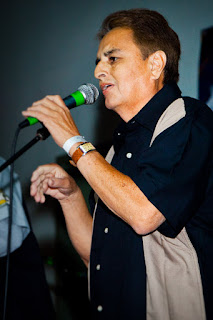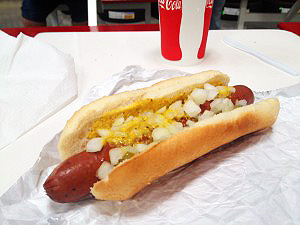I don’t know if other industries are like this, but the ad community is a small one. Especially in L.A. Because of that, you wind up seeing a lot of the same faces at different agencies around town. Sometimes a good thing, sometimes not.
In the case of Danny Alegria, it was more than a good thing: it was a blessing.
Danny either worked in the studio or was the studio manager at three agencies I had the good fortune to work with him at: DBC, DDB and Y&R.
Ad agencies just love their initials don’t they?
Danny was always a bright light in what could be a dark environment. Being in the studio, he was ground zero for stressed out account and creative people throwing fits when it came to getting something they usually needed yesterday out the door to a client, or materials for a big presentation or new business pitches.
Regardless of the pressure and tantrums that came his way, he had a good word for everyone (something extremely difficult to do at agencies). And there was never a question about him getting what you needed done.
Even though I’d known him for years, I’d never really sat down and talked to him until one very slow day at Y&R about nine or ten years ago. We wound up sitting down and literally talking for over three hours. He told me about his time in the Navy, his background as a singer, his years as a jockey, exactly how horseracing worked (not the way you’d think or hope), his family and more.
I couldn’t believe this fascinating person had been steps away from me for years, and yet only now was I just discovering who he was and learning about him.
I had always loved horseracing. In fact, when I was in college I loved it a little too much, to the tune of rent money on occasion. Danny and I made an agreement we’d take a trip out to Santa Anita, and he’d give me the lowdown on the horses and be my betting Yoda.
Sadly, we never got to make that trip.
Danny was diagnosed with cancer. But like everything else in my experience with him, he handled it with grace, honesty and dignity.
He would post unflinchingly on Facebook about how he was doing - the progress of both the treatment and the disease.
As to be expected with cancer as widespread as his had become, there were good days and bad days. But even on the bad days, the really bad ones, there would be a thread of optimism.
On one of his good days, he invited me to come see him give what he knew would be his last singing performance. I wouldn't have missed it. Not only did I get to see Danny perform, I got to see a lot of long, lost friends from agencies past we'd worked with over the years, who were also out in force to show support for him, and his talent that we didn't get to see nearly enough.
Danny was in great form that day, but it tired him out. It was easy to see the toll his cancer was taking.
I would text back and forth with him. I told him I'd come out to where he lived in Riverside and take him to lunch, or if he wasn't up to going out, bring it to him and we'd eat at his place and talk about the race track. I believe he was confined to his bed at that point, but even so he just told me he wasn't feeling well, but as soon as he rallied we'd do it.
Shortly after that conversation, on July 10, 2012, Danny died at the age of 60.
For me, it's certainly a personal loss, as I know it is for his family. But it's bigger than that: it's a global one. The world simply can't afford to lose people as decent, caring and loving as Danny always was to not just his family and friends, but everyone he encountered.
His Facebook page is still active, and every now and then I find myself re-reading some of the posts he put up as he was going through his ordeal. They are honest, inspiring, funny, heartbreaking and hopeful. I'm also friends with his daughter on there, and though I've never met her in person I feel as though we have a strong connection.
She is funny, bright and optimistic. Just like her old man.
Not a day goes by that I don't think about Danny and the meal together I was so looking forward to.
It's comforting knowing he's finally resting in well-deserved peace.
And that he's making heaven a much more rockin' place.







































